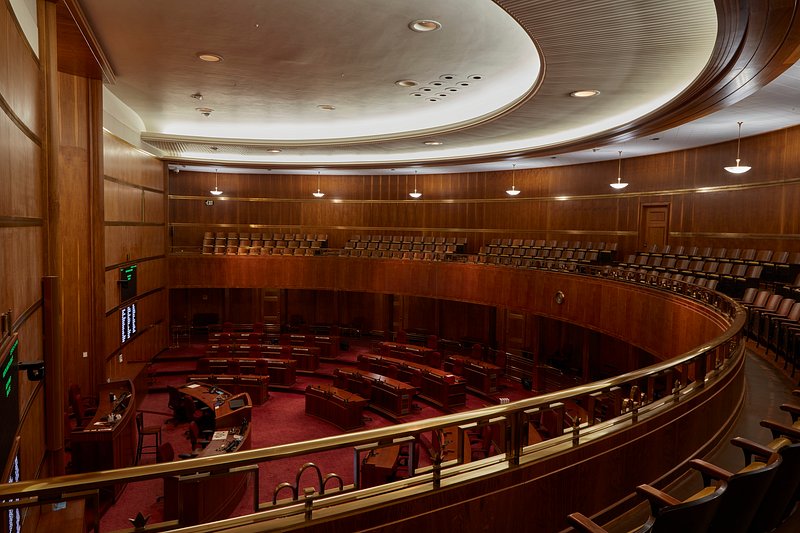In a groundbreaking decision, state senators in Pierre took a bold step towards reforming South Dakota’s unique felony drug ingestion law, a move that has sparked both celebration and debate across the state. The proposed legislation, Senate Bill 83, seeks to reclassify first or second-time drug ingestion offenses from felonies to misdemeanors, marking a significant shift in how the state approaches drug-related offenses.
Under the current law, the presence of a controlled substance in someone’s urine is punishable as a felony, akin to possessing the substance. This has led to challenges for those convicted, including difficulties in securing employment, housing, or education. The proposed changes aim to alleviate these burdens and provide a more compassionate approach to addressing addiction.
Sen. Tamara Grove
The bill’s narrow passage in the Senate, with an 18-17 vote, was a triumph for its sponsor, Sen. Tamara Grove, R-Lower Brule. Grove has been a persistent advocate for this reform, facing several attempts at passage since 2020. “Where are we going to go with these people after we’ve already spent a billion dollars to build a new prison?” Grove questioned on the Senate floor. “What we are doing right now does not work. If it worked, I wouldn’t be here.”
South Dakota, known for its vast landscapes and the iconic Mount Rushmore, is now in the throes of a broader debate over the financial and social implications of its criminal justice system. The state is planning the most expensive capital project in its history: an $825 million men’s prison near Sioux Falls and an $87 million women’s prison in Rapid City. This debate on incarceration is reflective of larger discussions nationwide about the effectiveness and cost of prison systems.
The proposed changes come in the context of a troubling statistic: ingestion is the most serious offense for 19% of men and 23% of women imprisoned for nonviolent crimes in the state. Critics argue that the current law unnecessarily contributes to the swelling prison population and disproportionately affects those struggling with addiction.
Sen. Red Dawn Foster
Sen. Red Dawn Foster, D-Pine Ridge, voiced concerns about the social costs of the current legal framework, stating, “By funneling people into things like the HOPE program, the state can deal with drug abuse on the front end, when we can actually support these individuals in addressing the addiction, not after this harm has grown so far that it has destroyed families, the community, and costs us as taxpayers a billion dollars.”
The HOPE program, or Honest Opportunity for Probation with Enforcement, is highlighted as a more effective response to drug offenses than incarceration. Inspired by a similar initiative in Hawaii, HOPE offers intensive probation supervision, including random drug testing and swift sanctions for violations, aimed at encouraging sobriety and reform.
Probation under HOPE is significantly cheaper than incarceration, costing about $10 a day compared to the $92 daily cost for prison. This economic rationale swayed Sen. Greg Blanc, R-Rapid City, who noted, “It’s not just a judicial problem, it’s a fiscal problem. It costs $92 a day to incarcerate.”
Having successfully navigated the Senate, SB 83 is now headed for consideration by a House committee. The outcome of this bill could herald a new era in how South Dakota addresses drug-related offenses, potentially serving as a model for other states grappling with similar issues.
This legislative effort reflects a growing recognition in South Dakota of the need to balance justice with compassion, focusing on rehabilitation and support for individuals battling addiction rather than imposing punitive measures that can perpetuate cycles of poverty and incarceration. As the state continues to debate this pivotal issue, the implications for its residents, its legal system, and its budgetary allocations remain profound.
South Dakota’s Path Forward
The stakes are high not only for those directly affected by the ingestion law but for the state as a whole as it contemplates the direction of its criminal justice policies. Advocates like Sen. Grove are hopeful that by shifting the focus from punishment to rehabilitation, the state can better support its residents, reduce prison populations, and decrease the financial burden on its taxpayers.
As South Dakota moves forward, this potential legislative change could signify a progressive step in addressing the complex issue of drug addiction, aligning with broader national trends towards criminal justice reform. The conversation continues, with eyes on the House as SB 83 progresses through the legislative process.
For more information on South Dakota’s legislative efforts, visit the 2025 South Dakota Legislature page.
